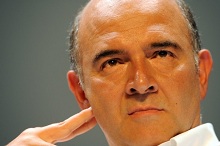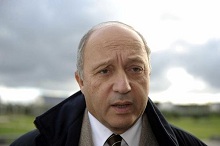After announcing Jean-Marc Ayrault as his prime minister yesterday, newly inaugurated president François Hollande announced the rest of his cabinet today.![]()
Laurent Fabius’s appointment as foreign minister was expected, even though he campaigned against the European Union constitution in 2005. Fabius (above, center) is a grandee of the Parti socialiste, having served as prime minister from 1984 to 1986 during the Mitterand administration, and later as finance minister from 2000 to 2002 under former prime minister Lionel Jospin.
Martine Aubry, a leftist firebrand who had been seen as a contender for prime minister and the runner-up to Hollande in the presidential nomination race, will not take part at all in the cabinet, which is mildly surprising. She had been allegedly offered and rejected a “super ministry” role from Hollande.
Nor will Ségolène Royal, Hollande’s one-time partner of four decades and former presidential candidate, which is not surprising, as it is rumored that she will be appointed president of the Assemblée nationale if the Parti socialiste wins June parliamentary elections.
The biggest surprise, perhaps, is the appointment of Pierre Moscovici as finance minister. Hollande’s campaign manager and former minister for European Affairs from 1997 to 2002, Moscovici (above, top) was close to former IMF managing director Dominique Strauss-Kahn. His European experience will guide him well, as the ongoing eurozone sovereign debt crisis stands to be the French economy’s largest immediate challenge for Hollande’s government.
Michel Sapin, another chief economic adviser to Hollande, had been tipped for finance minister, but will instead serve as labor minister. The fiscally conservative Sapin served as finance minister from 1992 to 1993 during the Mitterand administration and as the minister of Civil Servants and Sate Reforms from 2000 to 2002.
As expected, Manuel Valls, an up-and-coming MP, who served as the Hollande campaign’s communications chief and who comes from the more pro-market wing of the PS, was named interior minister. Nicolas Sarkozy used the interior ministry as a stepping stone in the mid 2000s to launch his successful 2007 campaign.
Former 2002 presidential candidate and the South America-born Christiane Taubira (above, bottom), who is currently an MP for French Guiana, will serve as minister of justice as the highest-ranking woman in a cabinet that will achieve gender parity. Taubira is not a member of the PS, but rather the founder of the French Guiana-based Walwari party and a bit of a “free electron” in French politics.
Nicole Bricq, a member of France’s Senate and another ally of Strauss-Kahn, will serve as minister of the environment.
Le Monde has a full infographic of the new cabinet here and full bios here.


